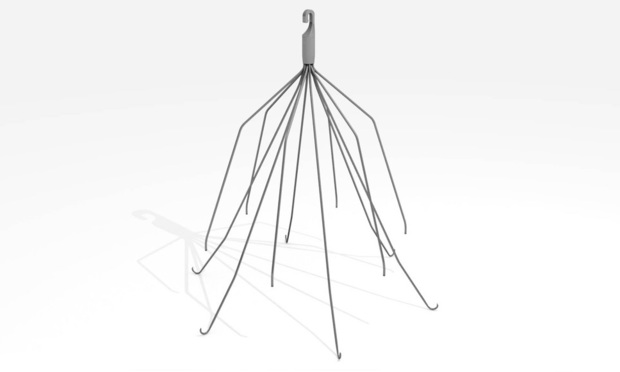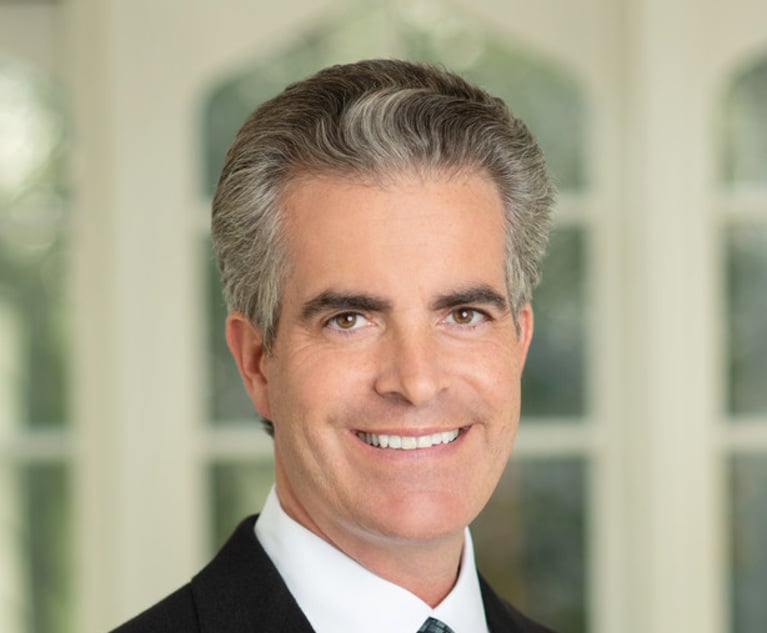Phila. Judge Asks Appeals Court to Back His Jurisdiction in Blood Filter Defect Case
Canada-based Angiotech Pharmaceuticals has argued that Pennsylvania courts lack jurisdiction over it. Judge Arnold New denied that challenge last month, and the company quickly appealed.
January 15, 2019 at 03:19 PM
4 minute read
 IVC blood filter.
IVC blood filter.
A Philadelphia judge has asked the Pennsylvania Superior Court not to hear a medical device distributor's attempts to prevent the Common Pleas Court from exercising jurisdiction in a mass tort involving allegedly defective blood filters.
Philadelphia Court of Common Pleas Judge Arnold New recently asked the Superior Court to quash the appeal of Angiotech Pharmaceuticals Inc. in In re Option Vena Cava Filter Litigation. The case, litigators say, may wade into novel questions of whether Pennsylvania's business registration law establishes jurisdiction over out-of-state defendants.
Canada-based Angiotech Pharmaceuticals has argued that Pennsylvania courts lack jurisdiction over it. New denied that challenge last month, and the company quickly appealed. But, in an order docketed Monday, the judge said the appeal was improper, and asked the Superior Court not to consider the challenge.
“Generally, an appeal may only be taken from a final order, which is an order disposing of all issues and all parties,” New said in the three-page order initially filed Jan. 10. “In this case, the court's Dec. 5 order does not dispose of all issues and all parties; rather, it sustained personal jurisdiction over a single defendant, Angiotech Pharmaceuticals Inc. Accordingly, this court's Dec. 5 order does not qualify as a final appealable order.”
The appeal stems from arguments that hinge in part on the closely watched issue of whether registering to do business in Pennsylvania subjects a company to being sued in Pennsylvania courts.
Angiotech has contended that, although one of its subsidiaries entered into an agreement to distribute the IVC filters, that subsidiary had not registered to do business in the Keystone State, and its only subsidiary that was registered to do business in Pennsylvania—a company called Surgical Specialties Corp.—had no involvement with the IVC filters.
“The detailed corporate organization of the two entities demonstrates that they are distinct and separate companies, engaged in different businesses, operating in different forums by different executives,” Angiotech contended in a Nov. 28 brief outlining its preliminary objections. “The mere existence of one subsidiary that is registered to do business in Pennsylvania (as well as five other states) is insufficient grounds to impose the exercise of general jurisdiction upon a parent company.”
According to Angiotech, Surgical Specialties is registered to do business in several states, including Delaware, California, Texas and New Jersey, and the subsidiary involved with IVC—referred to in court papers as Angiotech (US)—is incorporated in Washington state and has its principal place of business in Massachusetts.
The plaintiffs, however, contended that the evidence shows that both Angiotech (US) and Surgical Specialties are alter egos of their parent company.
“There is sufficient information available to support a finding that Angiotech has, through its wholly owned subsidiaries, consented to general jurisdiction in the commonwealth of Pennsylvania,” counsel for the plaintiff, Rosemary Pinto of Feldman Pinto, said in their Nov. 30 reply.
The plaintiffs cited the recent Superior Court decision in Webb-Benjamin v. International Rug Group, in which a three-judge panel determined that, despite recent U.S. Supreme Court precedent, language in Pennsylvania's business registration agreement establishes that companies consent to be sued in the state.
However, in the weeks since the IVC plaintiffs issued their reply, an expanded en banc Superior Court panel agreed to take up a case hinging on the same question of whether registering to do business in Pennsylvania establishes jurisdiction.
Eisenberg, Rothweiler, Winkler, Eisenberg & Jeck attorney Stewart Eisenberg, who is also counsel for the plaintiffs, said he agreed with New's decisions.
“A lot of defendants are appealing non-final orders on the basis that it's an unreasonable decision that's been made, but judges have the right to rule on personal jurisdiction,” he said.
Morrison Mahoney attorney Arthur Liederman, who is representing Angiotech, said the defendant is planning to pursue the appeal with the Superior Court, arguing, among other things, that it raises significant issues that have not been clearly addressed by the courts.
“We think it conflicts with the U.S. Supreme Court jurisprudence from Daimler [AG v. Bauman] to [Bristol-Myers Squibb v. Superior Court of California],” he said, adding that the ruling suggests that any distributor doing business with a Pennsylvania manufacturer is subject to jurisdiction in the Keystone State. “The question is whether or not this is an unwarranted expansion of jurisdiction.”
This content has been archived. It is available through our partners, LexisNexis® and Bloomberg Law.
To view this content, please continue to their sites.
Not a Lexis Subscriber?
Subscribe Now
Not a Bloomberg Law Subscriber?
Subscribe Now
NOT FOR REPRINT
© 2025 ALM Global, LLC, All Rights Reserved. Request academic re-use from www.copyright.com. All other uses, submit a request to [email protected]. For more information visit Asset & Logo Licensing.
You Might Like
View All
Superior Court Rejects Pa. Hospital's Challenge to $7.3M Med Mal Judgment
3 minute read
Longtime Reed Smith Health Care Partner Opts for Solo Practice Over Retirement
3 minute read
Pa. Appeals Court: Trial Judge Dismissed Med Mal Claims Without Giving Plaintiffs Proper Time to Fight Back
4 minute read
Pa. Hospital Agrees to $16M Settlement Following High Schooler's Improper Discharge
4 minute readTrending Stories
- 1Lawyers: Meet Your New Partner
- 2What Will It Mean in California if New Federal Anti-SLAPP Legislation Passes?
- 3Longtime AOC Director Glenn Grant to Step Down, Assignment Judge to Take Over
- 4Elon Musk’s Tesla Pay Case Stokes Chatter Between Lawyers and Clients
- 5Courts Demonstrate Growing Willingness to Sanction Courtroom Misuse of AI
Who Got The Work
J. Brugh Lower of Gibbons has entered an appearance for industrial equipment supplier Devco Corporation in a pending trademark infringement lawsuit. The suit, accusing the defendant of selling knock-off Graco products, was filed Dec. 18 in New Jersey District Court by Rivkin Radler on behalf of Graco Inc. and Graco Minnesota. The case, assigned to U.S. District Judge Zahid N. Quraishi, is 3:24-cv-11294, Graco Inc. et al v. Devco Corporation.
Who Got The Work
Rebecca Maller-Stein and Kent A. Yalowitz of Arnold & Porter Kaye Scholer have entered their appearances for Hanaco Venture Capital and its executives, Lior Prosor and David Frankel, in a pending securities lawsuit. The action, filed on Dec. 24 in New York Southern District Court by Zell, Aron & Co. on behalf of Goldeneye Advisors, accuses the defendants of negligently and fraudulently managing the plaintiff's $1 million investment. The case, assigned to U.S. District Judge Vernon S. Broderick, is 1:24-cv-09918, Goldeneye Advisors, LLC v. Hanaco Venture Capital, Ltd. et al.
Who Got The Work
Attorneys from A&O Shearman has stepped in as defense counsel for Toronto-Dominion Bank and other defendants in a pending securities class action. The suit, filed Dec. 11 in New York Southern District Court by Bleichmar Fonti & Auld, accuses the defendants of concealing the bank's 'pervasive' deficiencies in regards to its compliance with the Bank Secrecy Act and the quality of its anti-money laundering controls. The case, assigned to U.S. District Judge Arun Subramanian, is 1:24-cv-09445, Gonzalez v. The Toronto-Dominion Bank et al.
Who Got The Work
Crown Castle International, a Pennsylvania company providing shared communications infrastructure, has turned to Luke D. Wolf of Gordon Rees Scully Mansukhani to fend off a pending breach-of-contract lawsuit. The court action, filed Nov. 25 in Michigan Eastern District Court by Hooper Hathaway PC on behalf of The Town Residences LLC, accuses Crown Castle of failing to transfer approximately $30,000 in utility payments from T-Mobile in breach of a roof-top lease and assignment agreement. The case, assigned to U.S. District Judge Susan K. Declercq, is 2:24-cv-13131, The Town Residences LLC v. T-Mobile US, Inc. et al.
Who Got The Work
Wilfred P. Coronato and Daniel M. Schwartz of McCarter & English have stepped in as defense counsel to Electrolux Home Products Inc. in a pending product liability lawsuit. The court action, filed Nov. 26 in New York Eastern District Court by Poulos Lopiccolo PC and Nagel Rice LLP on behalf of David Stern, alleges that the defendant's refrigerators’ drawers and shelving repeatedly break and fall apart within months after purchase. The case, assigned to U.S. District Judge Joan M. Azrack, is 2:24-cv-08204, Stern v. Electrolux Home Products, Inc.
Featured Firms
Law Offices of Gary Martin Hays & Associates, P.C.
(470) 294-1674
Law Offices of Mark E. Salomone
(857) 444-6468
Smith & Hassler
(713) 739-1250





